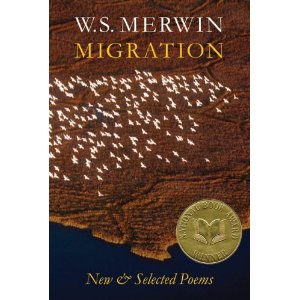W.S. Merwin’s Poet Laureate Appointment a Missed Opportunity for Diversity?
by Elizabeth Hoover / July 1, 2010 / No comments
Yesterday—as an estimated 60,000 barrels of oil gushed into the Gulf of Mexico—the Library of Congress named W.S. Merwin the next Poet Laureate. Merwin, 82, is a staunch environmentalist who actively works to save the fragile ecosystem in his home state of Hawaii. There he cultivates endangered native plants on the former pineapple plantation where he lives.
Far from being didactic, Merwin subtly weaves his commitment to the environment into his spare and lyrical poetry. His poem “Native Trees” opens,
Neither my father nor my mother knew
the names of the trees
where I was born
what is that
I asked and my
father and mother did not
hear they did not look where I pointed
Born in 1927 in New York City, he grew up Union City, New Jersey, and Scranton, Pennsylvania. In a 1985 interview with Contemporary Authors, he said, “The Pennsylvania that I grew up in and loved as a child isn’t there; I don’t mean it’s just been developed into suburbs either—it’s been strip-mined: it really is literally not there. This happens to a lot of people, but I don’t see why one has to express indifference about it.”
This refusal to be indifferent is at the core of Merwin’s craft as he writes with precision about the breathtaking rapidity with which we destroy our natural environment.
Merwin moved to Hawaii in 1976 to study Zen Buddhism after graduating from Princeton University and traveling in Europe as a private tutor. The landscape of the island is imprinted in his poetry, not only in his content but also in his craft. In his poem “History,” from the 1988 The Rain in the Trees, language transforms and shifts with the changing landscape. As the poem tracks the rotting of a shed, language too appears to break down as Merwin plays with the words blackberry, blackbird, and black branches. This poem ends, as do many of his poems, in loss, but he isn’t a pessimistic poet. He is constantly reminding us “there is still time.” A push-pull between loss and possibility marks much of his work.
Merwin is the author of more than 30 books of poetry, translations, and prose and the winner of two Pulitzers and a National Book Award.
“W. S. Merwin is an inevitable choice for poet laureate,” said poet Dana Gioia, a former chairman of the National told the New York Times.
However, for poet Francisco Aragón, the choice was far from inevitable. Aragón is the director of Letras Latinas, the literary program of the Institute for Latino Studies at the University of Notre Dame, and recently gave a reading at City of Asylum/ Pittsburgh. He said that he is “dismayed that U.S. poets of color continue to be rendered invisible by the Library of Congress.”
Merwin will be the 48th Poet Laureate—a position that only three people of color have held since the program began. In 1937, Joseph Auslander was appointed the country’s first (at that time the position was called Poetry Consultant.) He was followed by Allen Tate, whose most famous poem is “Ode to the Confederate Dead,” an apologia for the South with no mention of the “peculiar institution” that was, in part, what the Confederates died for. The first African-American Poet Laureate was Robert Hayden in 1976-1978, followed by Gwendolyn Brooks in 1985-1986, and Rita Dove in 1993-1995. There has never been a Latino, Asian-American, or American of native ancestry to hold the post.
Aragón offered up the names Martin Espada, Marilyn Chin, and Alberto Ríos as just a few qualified poets of color who could have been tapped for the position.
The Poet Laureate office is largely ceremonial and poets are free to do as much or as little with the extra visibility the position provides. Merwin vows to forefront his “lifelong concern with the environment,” as he told the New York Times. With the unprecedented environmental catastrophe in the Gulf, Merwin could be the perfect poet for the time. But, on the other hand, if the Library of Congress continues to ignore poets of color when appointing Laureates, the position may go from ceremonial to obsolete.
Read Elizabeth’s bio





